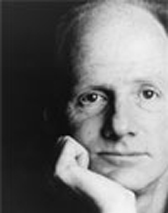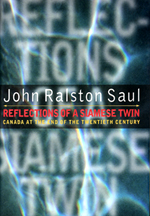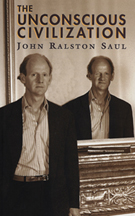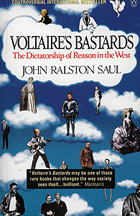 Saul on the crisis in Canada
Saul on the crisis in Canada


John Ralston Saul's recent book, Reflections of a Siamese Twin: Canada at the End of the Twentieth Century, follows three very successful earlier works, Voltaire's Bastards: The Dictatorship of Reason In the West, Toronto: Viking, 1992; The Doubter's Companion: A Dictionary of Aggressive Common Sense, Toronto: Viking, 1994; and The Unconscious Civilization, Concord, Ontario: Anansi, 1995 (The Massey Lectures for 1995). As well as an award-winning novelist, he's also a passionate and articulate thinker.

Dr. Jeremy Mouat spoke with John Ralston Saul at Athabasca University's Learning Centre in downtown Edmonton in December 1997 and asked about some of the issues raised in his latest book.
 The north as part of the vision of Canada
The north as part of the vision of Canada
Aurora: In your book, Reflections of a Siamese 
Twin: Canada
at the End of the Twentieth Century, you express some misgivings about
modern technology, especially its tendency to weaken the possibility for
reflection.
Saul: That's the way it's being used, in large part. That's the way the television networks are organized. It doesn't mean it can't be used in another way. It has to be used, as opposed to having it use you.
Largely what's happening today is that it's using us. We may well come through that and figure out how to use it and dominate it. That's what we're supposed to do: dominate machines. We invented them. We're not supposed to be their extension. But the fascinating thing is that increasingly the assumption is the opposite.
A number of provincial governments have announced over the last year that we need to move from education toward training. That idea is drawn from the late 19th century, from the belief that human beings are slightly more intelligent and therefore not-so-reliable versions of machines.
Aurora: I got an e-mail from a colleague in Ontario who repeated some comments that Premier Mike Harris made at a conference on the future of universities. I'm paraphrasing here, but Harris questioned the use of graduates in the humanities, geography and philosophy.
Saul: Utility is what we need.
Aurora: This person suggested that this represented an attack on thinking.
Saul: Well, that's what it is. Let me grossly simplify the argument just for the fun of it. Suppose you were like Mike Harris-or the premier of Alberta-completely a neocon [neo-conservative], completely in favour of globalization and all the clichés that come with it. You think this is not only inevitable, but this is the way it should go.

Then you stand back and say, "Okay, now that I am a neocon and I believe there's an invisible hand coming out of the sky, what is the right way to prepare the youth of Canada to put themselves into a win-win situation in the global economy? How do we go out there on the level playing field and win in the competition?"
So, you say, "Obviously we don't have 300 million people. We haven't got a big army. We don't have Hollywood. We're a medium small-sized country. We have to do what medium small-sized countries do, which—even though we're not smarter than other people—is to make ourselves seem to be smarter. We have to work harder and know more than other people."
You have to produce kids who speak a minimum of two languages, probably English and French, but they probably should have three or four languages to go anywhere or to do anything internationally. They have to have in-depth education in thought, philosophy, history, the social-political economics of Asia and northern Europe--a very complex education. Otherwise, they can't go out into a win-win situation. Obviously, if you are a neo-conservative you are in favour of raising taxes and hiring teachers. It goes without saying. How come they're not?
I tell this story because it shows that the kind of arguments we're given--as if they were true and inevitable and interesting--are really a load of garbage. They wouldn't pass a grade six exam on essay writing because they are so filled with profound contradictions. In fact, the attitudes toward training that neo-conservatives are putting forward are not simply attacks on thinking, they're a refusal of the idea of globalization.
If you spend a lot of time training kids on machines, you know perfectly well that by the time they get out of school, the machines are going to be obsolete. In the meantime, they haven't learned how to dance on one foot and think of six things at once, which is what they'll need to do in an unstable, changing world economy, where they're going to have to move their career five or six times in different directions. Philosophy is far more useful than turning a machine off and on.
The interesting thing is that these people are saying that they're in favour of globalization, but their policies are the policies of 19th century negative nationalists—policies which say, in effect, "We don't need to learn much. We're just fine here. We can cut down on education; we'll just teach the kids how to run machines." It doesn't work.
Aurora: One of the things I'd like your thoughts on is the persuasive power of the American media on our lives, and the way in which it prevents us from thinking clearly about our own country and its past.
Saul: The whole purpose of writing a book like this is not to demonstrate that I have the answers to any of our problems, which I don't, but to suggest that there are many other ways of thinking about how this country works and what the constituent parts of it are.
What is the role of our memory? What is our memory? What have we done? What is our experience? How did we get from 1850 to today? What are the lines ? There are all the negative lines, all the weaknesses, but what in fact were the positive lines, what were the concepts of the late 1830s and 1840s? I think you can see that when Canada works, it's a continuation of the idea of interested parties in communities, reaching out of their communities on the basis of a social contract.
The purpose of writing a book like this is to remind people of that: to demonstrate that there are a number of other ways of imagining the country. The problem of living next to Rome is the problem that you're living next to Rome, next to a centre of imperial power.
It becomes a serious problem when the section of your élite which takes power has no self-confidence, is stricken by an inferiority complex, by a sense of its own inability to govern responsibly in a particular place. Not that the place is apart from other places, not that it is better, but that it is atypical, peculiar, different, off-the-wall, strange.
This country was put together from the beginning in a way that was unlike the classic western nation-state. The classic western nation-state idea was monolithic—one language, one culture, one religion, one manifest destiny, a sacred border. But in Canada, really from the late eighteenth century on, after the arrival of the Loyalists, it was clear—even though we've had some down periods—that anything that's worked here has worked on the basis of co-operation between groups. That's what worked here. We're actually looking at a very long period of atypical success.
Suddenly in the last ten or twenty years, a group has come to power that has always existed. A colonial élite has suddenly grown with prosperity to become the dominant factor in the élite. The more moderate and reform-minded of the élite, which has links back to the LaFontaine-Baldwin tradition, has found itself in a minority no longer in power. It's also run out of ways of explaining its position without sounding like a loser.

Aurora: You make a great point in the book that Western alienation or Quebec nationalism are not issues we're going to resolve.
Saul: Nor should we. They're perfectly normal.
Aurora: It seems to me that you're speaking out against the idea of closure or resolution, against the assumption that there are obvious and ready answers for complex problems. The idea of simple answers is a product of the television age.
Saul: That's partly true, but I think it's also the result of the loss of confidence in the élite in this country. They don't believe it's possible to run a complex atypical country. They think Canada has to conform.
The principal characteristic of the inferiority complex is the desire to conform and those are the kind of people we have dominating the country today. They are very aggressive, but people who aren't sure of themselves usually are aggressive. They're driving forward with a little lip service to things like two official languages, but when you actually look at the principal policies being put in place, they're all policies that relate to a monolithic mythology, a centralized view, a single-solution view and above all, resolution. We must resolve; we must end things. The whole principle of Canada from the very beginning was that it was a continuous experiment.
Clearly, it gets more and more complicated with technology and the way in which it penetrates Canada. You won't get an argument from me on that, but what makes it unbearable or impossible to deal with is the inability of people in positions of power to imagine otherwise. The citizens seem to be able to imagine otherwise, and again and again the citizens are resisting the push towards normalizing Canada. The push toward normalization and conformity is from the élite.
Aurora: But that normalization, I would argue, is conforming to the American model. That's one thing I found myself occasionally arguing with you in the book.
Saul: Good!
Aurora: The issues that you raise in the book about victimization, the sense of Us and Them, of the bits of the country coming apart-the sense of greater isolation between Quebec and Alberta, for example—this in part reflects the fact that there are two quite powerful provincial premiers at the moment. It's difficult to conceive that's going to change very much. How do you feel the structure of the country affects what's going on?

Saul: In the second or third last chapter of the book I say that one of the major structural errors made in putting Canada together was the decision in the late nineteenth to early twentieth century to hand these enormous Northwest Territories over to the existing provinces. They simply added them to these southern colonies or provinces. It was a real failure of the imagination. You end up structuring the provinces on the basis of this enormous northern territory filled with riches, which are drained toward cities in the south. The North gets emptier and emptier.
The urban mythology of the North, apart from cross-country skiing, is essentially negative: "Who would want to live up there anyway? It's so boring; it's so cold. The winter!" That's really a self-justification. It creates a totally artificial debate in the country because the reality of the country is that most of it lies north of where these cities are. The cities convince themselves that what really matters is where the people are. I'm sorry, that isn't the way it works. The country is the people and the territory. You don't just keep the territory because you're using it. You get to keep it because it's part of your vision of the country.
We would have been far better off if we'd ended up with 18 or 25 provinces or if we'd simply cut a line across Canada half way up. Edmonton and Calgary would be two separate capitals in two separate provinces. B.C. would be three separate provinces, with the north (Prince George governing), and the south, and Vancouver Island. Ontario could certainly be two provinces, and Quebec as well, probably more than that (but certainly Chicoutimi would have been the northern capital). That would have drawn the debate away from this artificial borderline view of the country into the reality of the country. Not the reality simply in terms of the quantity of the territory, but the reality of the country in terms of where the riches come from, between the North and the South. It's a much healthier debate, a much more real debate and a much more sensible mythological debate.
Aurora: I may be sounding like a broken record, but part of this seems to me to be the impact of American media. We can no longer imagine our own lives as real. In places like Saskatchewan, for example, people are leaving the farms. Everyone is moving into the city. In a way, it's because they can no longer imagine a life away from the city.
Saul: That's right. The urban mythology has dominated, and says, "Why are you living in the country? The country is for cross-country skiing, at most." But on the other hand, I think that it's worth taking an extra step back from that idea of the American mythology and to stress that the American mythology is not really American at all. It's actually European.

The fundamental problem is that it's much more complex than believing we are the inferior party on this continent and that we only came into existence because we didn't want to be American. This is one of the garbage arguments that people like Donald Creighton are responsible for, which is totally untrue when you look at what Canadians were saying in the 1830s, '40s and '50s. People imagined the country. LaFontaine and Baldwin had very clear ideas about what they were doing. The movement was a positive movement, not a negative movement, and it wasn't a British imperial movement either. We weren't doing this for the Queen. We had an idea of what we could do here, and it was very different from what the British might have imagined.
You need to step back from this idea that we exist as a negative reflection of the United States and always did—the idea that they are the real American experiment and that's why their mythology dominates this continent. The United States isn't American at all. The United States is the perfect child of Europe. It's the European nation state as dreamt of in the eighteenth and nineteenth century: monolithic, the notion of manifest destiny, the drive to conquer anybody who gets in your way, sacred borders, the whole structure of the Declaration of Independence and the Constitution. All of this is the North American adaptation of ideas that came from Rousseau and Locke.
This is Europe, applied as the Europeans were never able to do it. Why? Because from the eighteenth century on, every time the French army crossed the French border into Germany or wherever, they didn't get very far, or they got there for ten years and then had to come back. Finally, by 1945 they'd killed enough of each other that they gave up on the idea of a monolithic Europe.

Europe gave up on the idea of Europe in 1945 and leapt backward to a mediaeval idea of Europe. This is the idea that there's a continent in which there are various groups living side-by-side with different characteristics. Europe isn't Europe at all anymore.
Canada—if you examine what we've done here, because of the poverty, because of the North, because of 70,000 Loyalists arriving and finding 70,000 Francophones and hundreds of thousands of natives —held no possibility of subsuming one mythology. Because of that, right from the beginning, the positive side of the Canadian experiment was coming to terms with Place, with the role of the unconquered place, with several groups living together in that place.

Actually, we're not being penetrated by American mythology. We're being penetrated by eighteenth and nineteenth century European mythology. The United States is Europe. We say we're more European. Europeans have already given up on that idea of Europe. They've gone to this mediaeval idea, which is the closest thing they have to the Canadian idea. Canadians, because we've had to come to terms with where we are, are really a profoundly American nation. We're much more American than the United States. A temperate nation doesn't need to have a great relationship to place because it conquers the place and reconstructs it to its own model. We can't reconstruct this place in our own image.
For information on ordering Reflections of a Siamese Twin: Canada at the End of the Twentieth Century. You may also ask Raulston Saul about his book when visiting this page (Penguin Books, Canada).
An entry on John Ralston Saul, from the Canadian Encyclopedia
1. The United Empire Loyalists supported Britain during the American Revolution. They subsequently left the new republic, settling in what is now Canada during the early 1780s. Back to interview
2. Louis-Hippolyte LaFontaine (1807-1864) and Robert Baldwin (1804-1858) were politicians of Lower Canada (now Quebec) and Upper Canada (now Ontario) respectively. After the union of the two colonies into the Province of Canada in 1841, the two men helped to establish a progressive political group with representatives from both regions. Back to interview
3. Donald Grant Creighton (1902-1979), was a prominent Canadian historian committed to history "as a literary art. …His increasingly didactic works warned against the threats of continentalism and regionalism." [The Canadian Encyclopedia, Hurtig, 1988. p533-4]. Back to interview
4. Jean-Jacques Rousseau (1712-1778) and John Locke (1632-1704) were political philosophers whose ideas about individual rights and government authority informed both the French and American Revolutions. Back to interview
Since this interview, Saul has published six novels, including The Birds of Prey, The Field Trilogy, which deals with the crisis of modern power and its clash with the individual. As well, Baraka or The Lives, Fortunes and Sacred Honor of Anthony Smith, The Next Best Thing, and The Paradise Eater. His most recent work of fiction - the first in over fifteen years - is Dark Diversions, a picaresque novel in which he observes the life of modern nouveaux riches Americans.
Current information and news can be found on his website at http://www.johnralstonsaul.com/eng/
Updated March 2014
An Aurora Update
Aurora Online
Citation Format
Jeremy Mouat(1997) An Interview with John Ralston Saul, Aurora Online